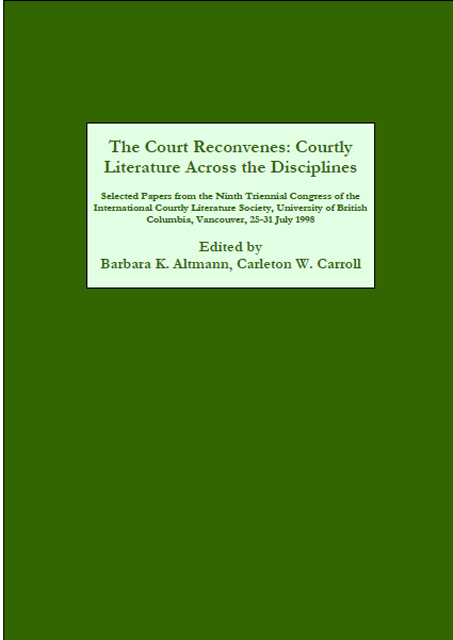 The Court Reconvenes
The Court Reconvenes Implications of the Female Poetic Voice in Le Roman de Flamenca
Published online by Cambridge University Press: 31 March 2023
Summary
In recent work on the trobairitz, the female troubadours, scholars have been exploring how the emergence of the female poetic voice affects the power relationship traditionally constituted by the feudal model which underlies fin’amor. Critics have attempted to determine whether the lady continues to represent herself as occupying the superior position in the hierarchy, appropriates “the masculine role” as the humble vassal, or represents herself as an equal partner as her position within the text shifts from object of desire to loving subject. The thirteenth-century Old Occitan romance Le Roman de Flamenca, a text long recognized as being strongly influenced by the lyric, provides an additional fertile site in which to examine the effect of the female poetic voice on power relationships. Although there is no internal evidence either that the Flamenca poet was familiar with the lyrics or that the trobairitz were familiar with Flamenca, and although Flamenca was almost certainly composed by a male poet, making the title character's voice an example of what Pierre Bec terms féminité textuelle, the romance was likely composed during the same time as many of the trobairitz lyrics, and Flamenca's self-representation during her extensive discussion of appropriate behavior for lovers and ladies offers additional insight into the female perspective on the power struggle implicit in the game of love. Focusing both on selected trobairitz and Flamenca herself, this paper will explore how Flamenca's discourse can be construed as representing the female poetic voice and how her voice resembles and differs from the voices of the trobairitz.
For about the first third of the romance, despite being the title character and the object of Guilhem's love and her husband's jealousy, Flamenca is not only enclosed in a tower and physically covered when allowed to attend church services, but her voice is almost entirely absent from the text as well. We are informed that Flamenca is greatly distressed by being confined in the tower, but unlike her husband, her soon-to-be lover and the narrator, who repeatedly expound upon their feelings in painstaking detail, Flamenca is exiled from the text by another man, this time the author, as her pain is merely recounted through narratorial exposition.
- Type
- Chapter
- Information
- The Court ReconvenesCourtly Literature across the Disciplines: Selected Papers from the Ninth Triennial Congress of the International Courtly Literature Society, University of British Columbia, Vancouver, 25-31 July 1998, pp. 133 - 140Publisher: Boydell & BrewerPrint publication year: 2002


